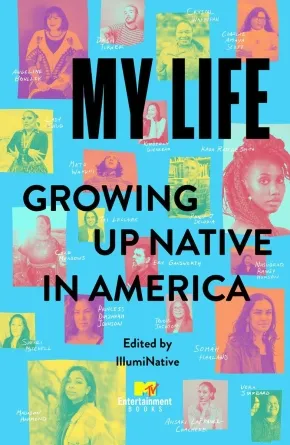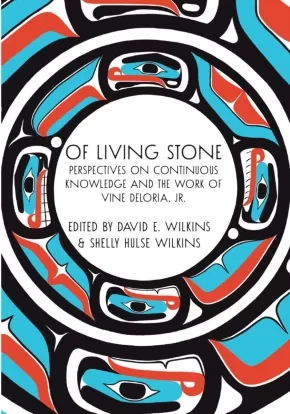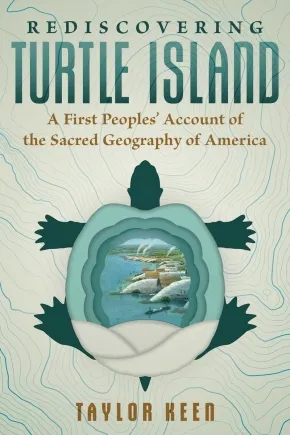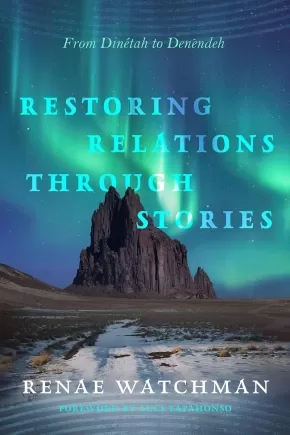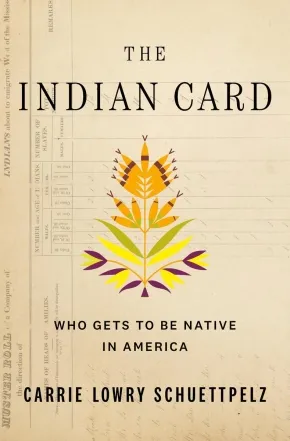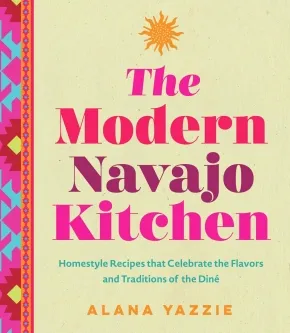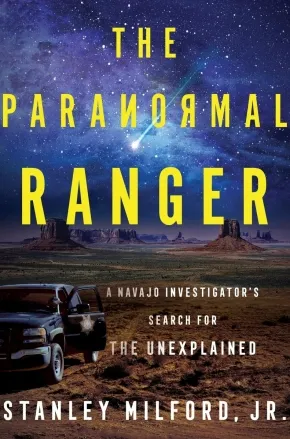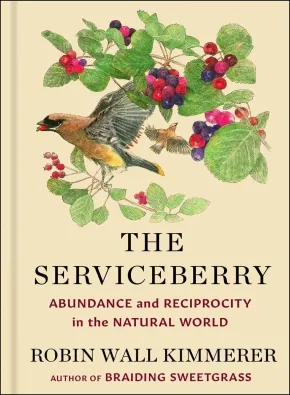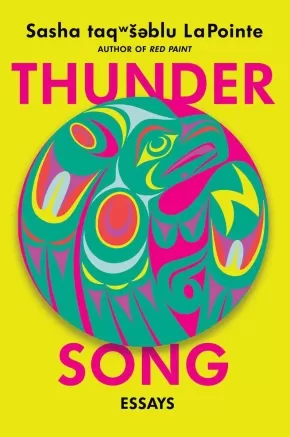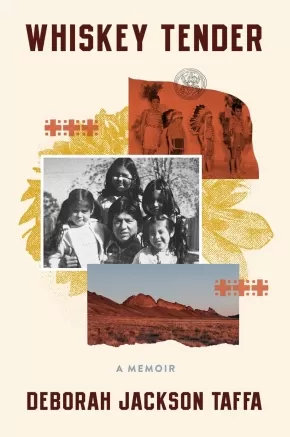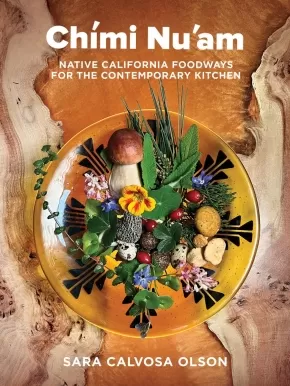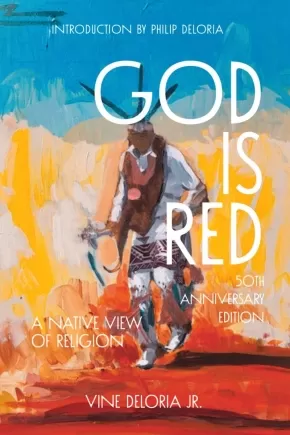Native American
Synopsis:
A moving collection of twenty powerful essays, poems, and more that capture and celebrate the modern Native American experience, featuring entries by Angeline Boulley, Madison Hammond, Kara Roselle Smith, and many more.
With heart, pathos, humor, and insight, twenty renowned writers, performers, athletes, and activists explore what it means to be Native American today. Through a series of essays and poems, these luminaries give voice to their individual experiences while shedding light on the depth and complexity of modern Native American identity, resiliency, and joy.
The topics are as fascinating and diverse as the creators. From Mato Wayuhi, award-winning composer of Reservation Dogs, honoring a friend who believed in his talent to New York Times bestselling author Angeline Boulley exploring what it means to feel Native enough, these entries are not only an exploration of community, they are also a call for a more just and equitable world, and a road map toward a brighter future.
Edited by IllumiNative, an organization dedicated to amplifying contemporary Native voices, My Life: Growing Up Native in America features contributions from Angeline Boulley, Philip J. Deloria, Eric Gansworth, Kimberly Guerrero, Somah Haaland, Madison Hammond, Nasugraq Rainey Hopson, Trudie Jackson, Princess Daazhraii Johnson, Lady Shug, Ahsaki Baa LaFrance-Chachere, Tai Leclaire, Cece Meadows, Sherri Mitchell, Charlie Amaya Scott, Kara Roselle Smith, Vera Starbard, Dash Turner, Crystal Wahpepah, and Mato Wayuhi.
Additional Information
224 pages | 5.50" x 8.37" | 16-pg b&w insert | Hardcover
Synopsis:
Of Living Stone: Perspectives on Continuous Knowledge and the Work of Vine Deloria, Jr. is a collection of new essays on the legacy of Vine Deloria, Jr., one of the most influential thinkers of our time. This insightful collection features more than thirty original pieces, bringing together Tribal leaders, artists, scientists, activists, scholars, legal experts, and humorists. A group of French scholars offers surprising perspectives on Deloria’s continuing global influence. Readers will find thoughtful and creative views on his wide-ranging and world-changing body of work. Some build upon his ideas while others offer important criticisms. In addition to its content, this volume is unique in that it was designed to center the traditional exercise of continuous knowledge whereby information is routinely shared, considered, and pragmatically adapted as it flows between generations. In this way, people, ideas and traditions remain alive and relevant—not set in stone —as the past is honored by those living in the present as they prepare for the future.
The book includes contributions from a number of remarkable individuals, including:
- Climate expert Margaret Redsteer (Crow)
- Melanie Yazzie (Diné), host of The Red Power Hour podcast
- Cheryl Crazy Bull (Sicangu Lakota), president of the American Indian College Fund
- Activists Faith Spotted Eagle (Yankton Dakota) and Lauren Schad (Cheyenne River Lakota)
- Writer and producer Migizi Pensoneau (Ponca/Ojibwe)
- Environmental scientists Kyle Whyte (Citizen Potawatomi) and Ryan Emanuel (Lumbee)
- Experts on Tribal Governance Deron Marquez (Yuhaaviatam of San Manuel), Frank Ettawageshik (Little Traverse Bay), Norbert Hill (Oneida), Megan Hill (Oneida), and Marty Case.
- Artists Cannupa Hanska Luger (MHA-Three Affiliated Tribes) and James Johnson (Tlingit)
- Legal Scholars Sarah Deer (Muscogee), Rebecca Tsosie (Yaqui descent), and Gabe Galanda (Round Valley)
- Archaeologist Paulette Steeves (Cree-Metis)
- Scholars of Indigenous Traditions Noenoe Silva (Kānaka Maoli), Natalie Avalos (Chicana of Mexican Indigenous descent), Tom Holm (Cherokee), and Greg Cajete (Tewa-Santa Clara Pueblo).
Time magazine named Vine Deloria, Jr. as one of the greatest thinkers of the twentieth century, and his research, writings, and teachings on history, law, religion, and science continue to influence generations of Indigenous peoples and their allies across the world.
Reviews
“For me as a young person in the 1980s and 1990s, Vine was the only stranger I thought of as family. He was funny and heart-stabbingly blunt. So we have Vine Deloria to thank for revitalizing Indigenous knowledge gathering. Inspired by Vine’s life work, Anishinaabe people now understand that we learn by listening (bzindamowin), observing (gnawaaminjigewin), and ceremony (manidookewin). We also know it’s important to have a LOT of fun (miiziiwapine). Of Living Stone is both a somber memorial and a raucous celebration of Vine’s work.”—Matthew Fletcher (Grand Traverse Band of Ottawa and Chippewa Indians), University of Michigan, and author of The Ghost Road
Additional Information
528 pages | 6.00" x 9.00" | Paperback
Synopsis:
An exploration of Indigenous cosmology and history in North America
• Examines the complexities of Indigenous legends and creation myths and reveals common oral traditions across much of North America
• Explores the history of Cahokia, the Mississippian Mound Builder Empire of 1050-1300 CE, told through the voice of Honga, a Native leader of the time
• Presents an Indigenous revisionist history regarding Thomas Jefferson, expansionist doctrine, and Manifest Destiny
While Western accounts of North American history traditionally start with European colonization, Indigenous histories of North America—or Turtle Island—stretch back millennia. Drawing on comparative analysis, firsthand Indigenous accounts, extensive historical writings, and his own experience, Omaha Tribal member, Cherokee citizen, and teacher Taylor Keen presents a comprehensive re-imagining of the ancient and more recent history of this continent’s oldest cultures. Keen reveals shared oral traditions across much of North America, including among the Algonquin, Athabascan, Sioux, Omaha, Ponca, Osage, Quapaw, and Kaw tribes. He explores the history of Cahokia, the Mississippian Mound Builder Empire of 1050–1300 CE. And he examines ancient earthen works and ceremonial sites of Turtle Island, revealing the Indigenous cosmology, sacred mathematics, and archaeoastronomy encoded in these places that artfully blend the movements of the sun, moon, and stars into the physical landscape.
Challenging the mainstream historical consensus, Keen presents an Indigenous revisionist history regarding Thomas Jefferson, expansionist doctrine, and Manifest Destiny. He reveals how, despite being displaced as the United States colonized westward, the Native peoples maintained their vision of an intrinsically shared humanity and the environmental responsibility found at the core of Indigenous mythology.
Building off a deep personal connection to the history and mythology of the First Peoples of the Americas, Taylor Keen gives renewed voice to the cultures of Turtle Island, revealing an alternative vision of the significance of our past and future presence here.
Reviews
“Brother Keen, with his infinite Indigenous and academic knowledge, brings forth amazing truths about ancient North American cultures the modern world was unaware of. Not only are the ancient earthworks extensive and scientifically and astronomically complex but Keen unveils they are all connected across the entire continent, mirroring the heavens. Simply incredible research.” — Scott Wolter, host of History 2 (H2) Channel’s America Unearthed, world-renowned forensic geol
“Careful analysis by Taylor Keen of the placement and designs of earthworks of the Indigenous people of North America reveals far more complex planning and design was involved than just random location selection of mounds for burials, as we were taught to think. His geographical analysis reveals the sacred earthworks designs were far more advanced and esoteric in nature, something he is uniquely qualified to understand as Indigenous himself and a member of several esoteric orders. He proves definitively the intricate level of knowledge of astronomy, heavenly body movements, mathematics, and cosmology involved in the creation of these earthworks, not only at a local level, but incredibly as long-range alignments as well. This revelation, Keen explains, was something that was dismissed and suppressed by early nineteenth-century archaeologists who breached and destroyed the sacred earthworks and burial mounds as part of the promotion of ‘manifest destiny,’ with the intent being justification of taking tribal lands for settlement. Keen’s incredibly important work gives a whole new perspective on the history of North America.” — Janet Wolter, coauthor of America: Nation of the Goddess
“The official history of the United States begins with Spanish contact in the late fifteenth century. The oral traditions and legends of the various Native peoples of North America, however, stretch back much earlier, into the opaque mists of preliterate times. With a member of the Earthen Bison Clan of the Omaha Tribe to serve as our guide, Rediscovering Turtle Island leads the reader along near-forgotten, overgrown paths that twist and turn throughout a resacralized landscape, decorated with ancient landmarks, populated with whispering ghosts and supernatural beings. The sacred geography of America will never again appear the same.” — P. D. Newman, author of Native American Shamanism and the Afterlife Journey in the Mississippi Valle
“What could be more fascinating than the origin of mankind itself? The premise is staggering and the consequences far-reaching. Keen’s hard work pays off immensely in Rediscovering Turtle Island, and readers will be gripped by that experience on every page.” — Sidian M.S. Jones, coauthor of The Voice of Rolling Thunder
Additional Information
208 pages | 6.00" x 9.00" | 70 b&w illustrations | Paperback
Synopsis:
Restoring Relations Through Stories introduces, synthesizes, and analyzes traditional stories by Diné and Dene storytellers in orature and film. The book conceptualizes narrative autonomy as hane’tonomy and visual storytelling from a Diné perspective, offering a map for re-storying that resists inauthentic and misappropriated stories. Watchman centres Indigenous narratives and examines how these narratives are tied to land and relations.
In the book’s final movement, the author explores the power of story to forge ancestral and kinship ties between the Diné and Dene, across time and space, through re-storying of relations.
Reviews
“Watchman shows how the old stories, maintained over centuries . . . tie together the Diné and Dene through ancestral and linguistic connections. The works that are surveyed herein reinforce the import of remembering, retelling, and revising the old stories so that they are germane today.” —Luci Tapahonso, inaugural Poet Laureat of the Navajo Nation
“Restoring Relations Through Stories shows how land-based storying among Diné and Dene peoples is strong and continues in the twenty-first century and beyond. It demonstrates how Indigenous peoples continue to remain connected to the land and sustain distinctive ways of life through their narratives, lands, and filmmaking.” —Lloyd L. Lee, author of Diné Identity in a Twenty-First Century World
“Renae Watchman’s Restoring Relations Through Stories introduces readers to the powerful force of ‘Hane’tonomy’ and the work of Diné creatives who refuse misappropriated and inauthentic views by advancing decisive versions of their world. Hane’tonomy provides us all with a new framework for understanding complex works such as Sydney Freeland’s Drunktown’s Finest, Blackhorse Lowe’s 5th World, or Hollywood’s deracinating obsession with the Navajo Nation and Shiprock as a backdrop. It moves toward a meaningful, though potentially daunting, provocation in forging new connections through restorying with ancestral kin of the Diné in present-day Canada.” —Jeff Berglund, co-editor of The Diné Reader: An Anthology of Navajo Literature
“An affirmation of our continued connections to the Mother Earth through prayers, songs, and stories. The connections to each other as Diné and Dene are remembered in Watchman’s stories of placemaking.” —Jennifer Nez Denetdale, professor and Chair of American Studies, University of New Mexico
Additional Information
356 pages | 5.00" x 8.00"| Paperback
Synopsis:
In stunning full color and accessible text, a graphic adaptation of the American Book Award winning history of the United States as told from the perspective of Indigenous peoples—perfect for readers of all ages
Roxanne Dunbar-Ortiz’s influential New York Times bestseller exposed the brutality of this nation’s founding and its legacy of settler-colonialism and genocide. Through evocative full color artwork, renowned cartoonist Paul Peart-Smith brings this watershed book to life, centering the perspective of the peoples displaced by Europeans and their white descendants to trace Indigenous perseverance over four centuries against policies intended to obliterate them.
Recognized for his adaptation of W.E.B. DuBois’ The Souls of Black Folk and his extensive expertise in the comics industry, Peart-Smith collaborates with experienced graphic novel editor Paul Buhle to provide an accessible introduction to a complex history that will attract new generations of readers of all ages. This striking graphic adaptation will rekindle crucial conversations about the centuries-long genocidal program of the US settler-colonial regime that has largely been omitted from history.
Reviews
“Adapting a work of history as dense and as vital as Dunbar-Ortiz’s An Indigenous Peoples’ History of the United States (2014) to comics form is no easy feat, but Peart-Smith is up for the task . . . A thoughtful, radically hopeful work that is sure to resonate with readers of all ages.” - Booklist
Educator Information
The publisher does not provide a recommended age range, but notes in the description that this graphic interpretation "will attract new generations of readers of all ages".
Table of Contents
Additional Information
120 pages | 8.22" x 10.28" | Hardcover
Synopsis:
A groundbreaking and deeply personal exploration of Tribal enrollment, and what it means to be Native American in the United States
Who is Indian enough?
To be Native American is to live in a world of contradictions. At the same time that the number of people in the US who claim Native identity has exploded—increasing 85 percent in just ten years—the number of people formally enrolled in Tribes has not. While the federal government recognizes Tribal sovereignty, being a member of a Tribe requires navigating blood quantum laws and rolls that the federal government created with the intention of wiping out Native people altogether. Over two million Native people are tribally enrolled, yet there are Native people who will never be. Native people who, for a variety of reasons ranging from displacement to disconnection, cannot be card-carrying members of their Tribe.
In The Indian Card, Carrie Lowry Schuettpelz grapples with these contradictions. Through in-depth interviews, she shares the stories of people caught in the mire of identity-formation, trying to define themselves outside of bureaucratic processes. With archival research, she pieces together the history of blood quantum and tribal rolls and federal government intrusion on Native identity-making. Reckoning with her own identity—the story of her enrollment and the enrollment of her children—she investigates the cultural, racial, and political dynamics of today’s Tribal identity policing. With this intimate perspective of the ongoing fight for Native sovereignty, The Indian Card sheds light on what it looks like to find a deeper sense of belonging.
Reviews
“The Indian Card is a candid, unflinching look at the sometimes subtle, sometimes ruthless ways federal policies undermine Indigenous culture and society. Carrie Schuettpelz understands first-hand how official tribal membership rations not only access to benefits such as healthcare and housing stipends, but also an ineffable sense of belonging. Her thorough excavation of the painful history that gave rise to rigid enrollment policies is a courageous gift to our understanding of contemporary Native life.”– The Whiting Foundation Jury's Note
"The Indian Card is all at once an intimate portrait, a sweeping history and a thoughtful examination of tribal identity, Native sovereignty and the quest for belonging."—WBUR
"Carrie’s book is so dang good you need to get two copies: one for you and then the other for a friend. Schuettpelz, with so much research and interviews, shares the stories of people caught in the mire of identity-formation with such ease. The voice is pitch perfect, there is not one wrong word and the content is written with so much grace and elegance and honesty you can’t help but finish Schuettpelz’s work knowing it will live on for as long as it takes to unravel the many, many contradictions surrounding what it means to Native American today." - Morgan Talty, author of Fire Exit
"A well researched book for readers who are curious or confused about complex kinship relationships in Native America. Armed with personal experience, interviews, and scholarly data, Carrie Lowry Schuettpelz tackles the political nature of Indigenous identity with clarity and concision."—Deborah Taffa, author of Whiskey Tender
"Illuminating...An innovative exploration of a thorny issue." —Publishers Weekly, starred review
"A clear and frank analysis of the challenges that define Native selfhood." —Kirkus Reviews
Additional Information
304 pages | 6.12" x 9.25" | includes 10-12 charts/figures and captions throughout | Hardcover
Synopsis:
Nourish your body and mind through food with these 60 recipes celebrating Navajo culinary traditions.
The Modern Navajo Kitchen takes you on an exhilarating journey for your taste buds. This beautifully photographed cookbook ties together traditional Navajo recipes as well as global recipes with a Navajo spin, creating a truly unique culinary experience! Choose from a plethora of drinks, breads, breakfasts, soups, mains, sides, and desserts—the sky’s the limit.
Incorporating traditional and modern ingredients, some of the deliciously nourishing and comforting recipes include:
- Navajo Boba Milk Tea (Abe’ Boba Dééhk’azí)
- Fry Bread (Dah Díníilghaazh)
- Navajo Burgers (Atsį’ Yik’ą́ Náneeskadí Bił Ałch’į’ Át’éhí)
- Sumac and Strawberry Greek Yogurt Ice Pops (Chiiłchin Yogurt Tiní)
- and more!
This comprehensive cookbook also includes instructions for how to make such things as juniper ash, roasted cornmeal, and roasted chiles that will bring your Navajo cooking skills to the next level. A short history of Navajo culinary traditions is provided to provide cultural context behind your new culinary experiences, and sample meal plans will help you put together the perfect menus for the week ahead or for those special occasions with family and friends.
Reconnect to your cultural heritage or treat your palate (or both!) with The Modern Navajo Kitchen.
Additional Information
192 pages | 8.00" x 9.50" | Colour Photos | Hardcover
Synopsis:
A Navajo Ranger’s chilling and clear-eyed memoir of his investigations into bizarre cases of the paranormal and unexplained in Navajoland
As a Native American with parents of both Navajo and Cherokee descent, Stanley Milford Jr. grew up in a world where the supernatural was both expected and taboo, where shapeshifters roamed, witchcraft was a thing to be feared, and children were taught not to whistle at night.
In his youth, Milford never went looking for the paranormal, but it always seemed to find him. When he joined the fabled Navajo Rangers—a law enforcement branch of the Navajo Nation who are equal parts police officers, archeological conservationists, and historians—the paranormal became part of his job. Alongside addressing the mundane duties of overseeing the massive 27,000-square-mile reservation, Milford was assigned to utterly bizarre and shockingly frequent cases involving mysterious livestock mutilations, skinwalker and Bigfoot sightings, UFOs, and malicious hauntings.
In The Paranormal Ranger, Milford recounts the stories of these cases from the clinical and deductive perspective of a law enforcement officer. Milford’s Native American worldview and investigative training collide to provide an eerie account of what logic dictates should not be possible.
Reviews
“Stanley Milford Jr. masterfully intertwines memoir, Diné creation stories, and true encounters with otherworldly phenomena. As a Navajo Ranger, Milford’s path is shadowed by eerie cryptids, mysterious UFOs, and the ever-present trials of his demanding role. His unwavering dedication, bravery, and deep cultural insight transform this narrative into a mesmerizing journey. Bridging the realms of legend and reality, each spine-chilling investigation illuminates the enduring spirit and wisdom of the Navajo people, offering readers a profound and unforgettable cultural experience.”— Shane Hawk, co-editor of Never Whistle at Night: An Indigenous Dark Fiction Anthology
“Stan’s life story is a true testament to the reverence that Native American culture has for the paranormal. His passion for investigating the otherworldly really shines. A fascinating read, and highly recommended!” — Steve Gonsalves, star of Ghost Hunters and bestselling author of A Life with Ghosts
“Many of Stan’s experiences recounted in this book parallel what we’ve seen on Skinwalker Ranch, with an eerie degree of similarity. Getting to learn more about Stan’s life and his Navajo-Cherokee heritage alongside these incredible stories is a meaningful bonus.” — Jim Morse, ranch manager and cast member of The Secret of Skinwalker Ranch
"Milford interweaves colorful stories from Navajo mythology that illuminate cultural beliefs about the origins of life, monsters, and the spirit world. . . . Engaging reading for adventurous minds." — Kirkus Reviews
"Equal parts memoir and supernatural record, Milford's book shares how these occurrences enlightened him. He leaves the reader with a unified theory of how paranormal phenomena are connected and what this means for us as human beings. And he demonstrates how experience and open-mindedness can, over a lifetime, build up to unparalleled expertise." — Booklist
Additional Information
256 pages | 6.00" x 9.00" | Hardcover
Synopsis:
From the #1 New York Times bestselling author of Braiding Sweetgrass, a bold and inspiring vision for how to orient our lives around gratitude, reciprocity, and community, based on the lessons of the natural world.
As Indigenous scientist and author of Braiding Sweetgrass Robin Wall Kimmerer harvests serviceberries alongside the birds, she considers the ethic of reciprocity that lies at the heart of the gift economy. How, she asks, can we learn from Indigenous wisdom and the plant world to reimagine what we value most? Our economy is rooted in scarcity, competition, and the hoarding of resources, and we have surrendered our values to a system that actively harms what we love. Meanwhile, the serviceberry’s relationship with the natural world is an embodiment of reciprocity, interconnectedness, and gratitude. The tree distributes its wealth—its abundance of sweet, juicy berries—to meet the needs of its natural community. And this distribution insures its own survival. As Kimmerer explains, “Serviceberries show us another model, one based upon reciprocity, where wealth comes from the quality of your relationships, not from the illusion of self-sufficiency.”
As Elizabeth Gilbert writes, Robin Wall Kimmerer is “a great teacher, and her words are a hymn of love to the world.” The Serviceberry is an antidote to the broken relationships and misguided goals of our times, and a reminder that “hoarding won’t save us, all flourishing is mutual.”
Reviews
“Robin Wall Kimmerer is writer of rare grace. She writes about the natural world from a place of such abundant passion that one can never quite see the world the same way after having seen it through Kimmerer’s eyes. In Braiding Sweetgrass, she takes us on a journey that is every bit as mythic as it is scientific, as sacred as it is historical, as clever as it is wise. She is a great teacher, and her words are a hymn of love to the world.” —Elizabeth Gilbert
“Robin Wall Kimmerer has written an extraordinary book, showing how the factual, objective approach of science can be enriched by the ancient knowledge of the indigenous people. It is the way she captures beauty that I love the most—the images of giant cedars and wild strawberries, a forest in the rain and a meadow of fragrant sweetgrass will stay with you long after you read the last page.” —Jane Goodall
“I give daily thanks for Robin Wall Kimmerer for being a font of endless knowledge, both mental and spiritual.”—Richard Powers, The New York Times
“Robin Wall Kimmerer opens a sense of wonder and humility for the intelligence in all kinds of life we are used to naming and imagining as inanimate.” —Krista Tippett, host of On Being
Additional Information
112 pages | 5.00" x 7.00" | Hardcover
Synopsis:
The author of the award-winning memoir Red Paint returns with a razor-sharp, clear-eyed collection of essays on what it means to be a proudly queer indigenous woman in the United States today
Drawing on a rich family archive as well as the anthropological work of her late great-grandmother, Sasha taqʷšəblu LaPointe explores themes ranging from indigenous identity and stereotypes to cultural displacement and environmental degradation to understand what our experiences teach us about the power of community, commitment, and conscientious honesty.
Unapologetically punk, the essays in Thunder Song segue from the miraculous to the mundane, from the spiritual to the physical, as they examine the role of art—in particular music—and community in helping a new generation of indigenous people claim the strength of their heritage while defining their own path in the contemporary world.
Reviews
"Blending beautiful family history with her own personal memories, LaPointe’s writing is a ballad against amnesia, and a call to action for healing, for decolonization, for hope." —Lauren Puckett-Pope, Elle
“It’s a provocative and wonderfully crafted collection exploring cultural legacies, colonialism, and finding your own path forward.” —Susie Dumond, BookRiot
"Lyrical prose elevates LaPointe’s incisive and heartfelt personal reflections. The result is a beautifully rendered snapshot of contemporary American Indigenous life." —Publishers Weekly
"These passionate essays, adamant in their activist pleas, reflect hard-won wisdom, as well as the representative significance of the author’s experiences. Probing and poignant reflections on Indigenous America." —Kirkus Reviews
“Sasha taqʷšəblu LaPointe’s essays in Thunder Song are loud, bold, and startlingly majestic. None of Sasha’s examinations fail to find truth: page after page, the intersections of family, heritage, history, and music build to countless transcendental moments for the reader, which is not only the magic of this book but a clear testament to Sasha’s immense storytelling power. She is a major talent. Thunder Song is masterful and wise, and it will not be forgotten.” ––Morgan Talty, National Bestselling author of Night of the Living Rez
Additional Information
256 pages | 5.36" x 8.30" | Hardcover
Synopsis:
Reminiscent of the works of Mary Karr and Terese Marie Mailhot, a memoir of family and survival, coming-of-age on and off the reservation, and of the frictions between mainstream American culture and Native inheritance; assimilation and reverence for tradition.
Deborah Jackson Taffa was raised to believe that some sacrifices were necessary to achieve a better life. Her grandparents—citizens of the Quechan Nation and Laguna Pueblo tribe—were sent to Indian boarding schools run by white missionaries, while her parents were encouraged to take part in governmental job training off the reservation. Assimilation meant relocation, but as Taffa matured into adulthood, she began to question the promise handed down by her elders and by American society: that if she gave up her culture, her land, and her traditions, she would not only be accepted, but would be able to achieve the “American Dream.”
Whiskey Tender traces how a mixed tribe native girl—born on the California Yuma reservation and raised in Navajo territory in New Mexico—comes to her own interpretation of identity, despite her parent’s desires for her to transcend the class and “Indian” status of her birth through education, and despite the Quechan tribe’s particular traditions and beliefs regarding oral and recorded histories. Taffa’s childhood memories unspool into meditations on tribal identity, the rampant criminalization of Native men, governmental assimilation policies, the Red Power movement, and the negotiation between belonging and resisting systemic oppression. Pan-Indian, as well as specific tribal histories and myths, blend with stories of a 1970s and 1980s childhood spent on and off the reservation.
Taffa offers a sharp and thought-provoking historical analysis laced with humor and heart. As she reflects on her past and present—the promise of assimilation and the many betrayals her family has suffered, both personal and historical; trauma passed down through generations—she reminds us of how the cultural narratives of her ancestors have been excluded from the central mythologies and structures of the “melting pot” of America, revealing all that is sacrificed for the promise of acceptance.
Reviews
“We have more Native stories now, but we have not heard one like this. Whiskey Tender is unexpected and propulsive, indeed tender, but also bold, and beautifully told, like a drink you didn’t know you were thirsty for. This book, never anything less than mesmerizing, is full of family stories and vital Native history. It pulses and it aches, and it lifts, consistently. It threads together so much truth by the time we are done, what has been woven together equals a kind of completeness from brokenness, and a hope from knowing love and loss and love again by naming it so.” — Tommy Orange, National Bestselling Author of There There
"What makes Taffa’s version exceptional is her visceral prose and sharp attunement to the tragedies of assimilation. This is a must-read."— Publishers Weekly (starred review)
"A warm and propulsive personal history that lucidly traces its Native and colonial legacies to draw a complex and humane portrait of a family and a pivotal political time in U.S. history. Taffa is a gifted raconteur and her memoir should be required reading for everyone in this country." — Melissa Febos, author of Body Work and Girlhood, winner of the National Book Critics Circle Award
Additional Information
304 pages | 6.00" x 9.00" | 6 Photographs | Hardcover
Synopsis:
Improve your well-being with Native American herbal medicine
Native American herbal medicine offers a powerful way to connect with the earth and heal naturally—and with this handbook of Native American herbs, you can learn all about herb uses and their restorative effects. Written by an Indigenous herbalist, this guide shows you how to responsibly use traditional plants to treat anxiety, colds, inflammation, and more.
This standout among books about herbs and healing will help you:
- Learn about a time-honored practice—Discover the origins and healing secrets of Native American herbalism, its traditional and modern uses, and how tools like the medicine wheel teach us about our relationship with the natural world.
- Identify the essential herbs—Explore the healing properties of medicinal herbs for wellness, from anise hyssop to yerba santa.
- Make 75 natural remedies—Ease physical and emotional ailments with Native American remedies, like Memory Support Tea, Stress-Induced Headache Tincture, and Antibacterial Healing Herb Liniment.
Tap into traditional wisdom with this Native American herbal medicine book for health and well-being.
Reviews
"A beautiful jumping-off point for anyone who is interested in practical herbalism. Angela organizes the wisdom of Native American herbalism in a way that is accessible for anyone to pick up and fold into their everyday life." —Kathleen Lee, acupuncturist, herbalist, and spiritual business mentor
"Angela is a wise and fierce protector of plant medicine and traditions of healing. Her first book, A Beginner's Guide to Native American Herbal Medicine, is a meaningful, accessible resource for readers who seek to ground themselves in understanding and build an herbal practice of integrity." —Graham Wesley
Additional Information
165 pages | 7.50" x 9.25" | full-colour photographs throughout | Paperback
Synopsis:
More than seventy delectable recipes that bring California’s Indigenous cuisines into kitchens today.
In this sumptuous cookbook, Sara Calvosa Olson (Karuk) reimagines some of the oldest foods in California for home cooks today. Meaning “Let’s eat!” in the Karuk language, Chími Nu’am shares the author’s delicious and inventive takes on Native food styles from across California. Over seventy seasonal recipes centered on a rich array of Indigenous ingredients follow the year from Fall (elk chili beans, acorn crepes) to Winter (wild boar pozole, huckleberry hand pies) to Spring (wildflower spring rolls, peppernut mole chicken) to Summer (blackberry braised smoked salmon, acorn milk freezer pops). Special sections offer guidance on acorn preparation, traditional uses of proteins, and mindful ingredient sourcing. Calvosa Olson has spent many years connecting her family’s foodways with a growing community, and these recipes, techniques, and insights invite everyone to Calvosa Olson’s table. Designed as an accessible entry for people beginning their journey toward a decolonized diet, Chími Nu’am welcomes readers in with Calvosa Olson’s politically attuned and irresistibly funny writing. With more than 100 photographs, this cookbook is a culinary gift that will add warmth and mouthwatering aromas to any kitchen.
Reviews
"This cookbook designed to uplift Indigenous California foods will delight foragers, adventurous home cooks, and those looking to connect with Native roots. It's a valuable addition to library shelves that will connect Native and non-Native Americans to the earth and its abundant gift of ingredients." —Library Journal
"With Chími Nu'am, Olson looks to encourage people to start thinking about a decolonized diet, connecting to the land and native ingredients prior to European colonization [... and] aims to make Indigenous ingredients and traditional Karuk recipes accessible to a whole range of home cooks." —Nina Friend, BBC World's Table
"Chími Nu’am is serious about taking a holistic view of reintegrating the healthfulness of traditional diets into modern lives, benefiting both personal well-being and the greater good." —Naomi Tomky, Atlas Obscura
"Calvosa Olson has written a book that will speak to multiple audiences. But whether she's guiding Indigenous readers to embrace more of their cultural foods or making recommendations for non-Indigenous readers interested in decolonizing their diets in an ethical way (hint: it's about reciprocity), her voice and philosophy come through clearly on the page." —Twilight Greenaway, Civil Eats
"To say that Chími Nu'am is just a cookbook is inaccurate. What took Calvosa Olson more than two years to write and publish is an expression of her life and an act of stewardship for the earth. [...] The author was raised to believe that if you take care of the land, the land will take care of you." —Prism
"Calvosa Olson invites readers to forage for and become more attuned to Indigenous and seasonal ingredients—nurturing a deeper connection to place and enhancing one’s role as an environmental steward." —Uprooted
"Connecting with nature is an approach to cooking that is often overlooked—but not for Sara Calvosa Olson. A native Californian raised by a Karuk mother, she is leading people on a path to decolonize their diets, one cup of manzanita flour at a time." —KCRW Good Food
"Connection to people and planet is central to both Calvosa Olson's personal approach to food as well as the message of Chími Nu'am." —Rachel Askinasi, The Messenger
"Besides being a creative, accessible cookbook, Calvosa Olson's work is a call for stewardship of the environment and an introduction to some local foods that have long been part of Native diets. It’s a terrific resource for foragers, teachers, libraries, classrooms, cooks, and anyone looking to learn more about the foodways of California's Indigenous peoples." —Edible East Bay
Additional Information
288 pages | 7.50" x 10.00" | Hardcover
Synopsis:
A 50th anniversary revised edition of the beloved classic, God is Red.
First published in 1973, Vine Deloria, Jr.’s God Is Red remains the seminal work on Native American religious views, asking the reader to think about our species and our ultimate fate in novel ways. Celebrating five decades of publication with this new edition, Deloria’s classic work reminds us to understand “that we are a part of nature, not a transcendent species with no responsibilities to the natural world.” It is time again to listen to Vine Deloria, Jr.’s powerful voice, informing us about a spiritual life that is independent of Western religion and that reveres the interconnectedness of all living things.
This new edition includes critical essays engaging with the original material by well-known Indigenous thinkers - Philip Deloria, Suzan Shown Harjo, Daniel Wildcat, and David E. Wilkins. Inside, the book covers a wide variety of topics including: the problem of creation, the origin of religion, Death, and Human personality.
“God is Red should be read and re-read by Americans who want to understand why the United States keeps losing the peace, war after war.” – Leslie Marmon Silko
Additional Information
360 pages | 6.00" x 9.00" | Paperback
Synopsis:
The gripping, forgotten tale of Ira Hayes—a Native American icon and World War II legend who famously helped raise the flag at Iwo Jima but spent the latter half of his life haunted by being a war hero.
IRA HAYES tells the story of Ira Hamilton Hayes from the perspective of a Native American combat veteran of the Vietnam generation. Hayes, along with five other Marines, was captured in Joe Rosenthal’s iconic photograph of raising the stars and stripes on Mount Suribachi during the battle for the Japanese Island of Iwo Jima. The photograph was the inspiration and model for the U.S. Marine Corps War Memorial in Arlington.
Between the time he helped raise that flag and his death—and beyond—he was the subject of more newspaper columns than any other Native person. He was hailed as a hero and maligned as a chronic alcoholic unable to take care of himself. IRA HAYES explores these fluctuating views of Ira Hayes. It reveals that they were primarily the product of American misconceptions about Native people, the nature of combat, and even alcoholism. Like most surviving veterans of combat, Ira did not think of himself as a heroic figure. There can be no doubt that Ira suffered from PTSD, which is a compound of survivor’s guilt, the shock of seeing death, especially of one’s friends, and the isolation brought on by feeling that no one could understand what he had been through. Ira’s life has been a subject of two motion pictures and a television drama. All these dramas sympathize with him, but ultimately fail to see his binge drinking as his way of temporarily escaping the melancholy, the rage he felt, his sense of betrayal, and the sheer boredom of peacetime.
IRA HAYES breaks apart the complexities of Ira’s short life in honor of all Native veterans who have been to war in the service of the United States. This is equally their story.
Reviews
"Written with page-turning excitement, Tom Holm, a Native scholar and veteran of Vietnam, offers an Indigenous realism through the heroic life of Ira Hayes, an Akimel O’odam marine in World War II. You will re-live the life of Ira Hayes who helped to raise the American flag at Iwo Jima after the bloodiest battle in Pacific during the war and became a legend. A gifted storyteller, Holm writes with an engaging insight making the reader feel right beside Ira Hayes in boarding school, combat, and struggling with PTSD."—Donald L. Fixico (Muscogee, Seminole, Shawnee and Sac and Fox), Regents’ and Distinguished Foundation Professor of History, Arizona State University
“WWII hero Ira Hayes would have appreciated this book. Author Tom Holm uses Ira’s courage and humility as tools to dissect the historic and current fate of his Native American people. And Ira’s challenges focus light upon the tragedy of war and the horrors of PTSD. A meaningful and beautifully-researched read.”—Judy Avila, bestselling author of Code Talker: The First and Only Memoir by One of the Original Navajo Code Talkers of WWII
“Tom Holm brilliantly and respectfully offers readers a rich and long overdue account of the life and tragic death of Ira Hayes that pierces through the stereotypes and misconceptions that plagued his during his life and long after his passing. It is a sensitive work that reminds us of the enormous emotional, psychological, and cultural difficulties Hayes had to cope with throughout his life. It is a splendid and timely contribution.” —Dr. David Wilkins, E. Claiborne Robins Distinguished Professor in Leadership Studies and citizen of the Lumbee Nation of North Carolina
“As a historian and a veteran, Tom Holm is uniquely positioned to write this important story, the first scholarly treatment of Hayes' life and times. Holm examines Hayes' struggles with fame and illness after World War II while offering insights into a post-war America hostile to Native identity and sovereignty despite the sacrifices made by Hayes and thousands of other Native Americans.”—Paul C. Rosier, Ph.D., Professor of History at Villanova University and author of Serving Their Country: American Indian Politics and Patriotism in the Twentieth Century
"An excellent piece of scholarship; the definitive work on this Native American veteran. Carefully nuanced and rich in context, Holm transcends and dispels the stereotypes of Ira Haye’s life to show the complexity of the Akimel O’odham experience, the impacts of World War II, the social use of alcohol in 1940s America, and his personal experiences from poverty, racism, and the unwanted and unending attention following the flag raising on Mount Suribachi. As Holm concludes, 'He should be remembered for who he was rather that for what the dominant society has been led to believe about him.'"—William C. Meadows, Missouri State University
"Tom Holm deservedly looms large in the history of Indigenous peoples’ military service in the wars of the twentieth century. In his new book, IRA HAYES, Holm reintroduces us to the iconic individual in ‘The Photograph’ of the flag-raising on Mount Suribachi. Holm extricates Hayes from the trope of tragedy and the racist stereotype of the ‘drunken Indian’ into which his story was confined during his lifetime and in which it remained trapped since his death. Instead, a complex Ira Hayes comes to life in the long context of his Akimel O’odham culture and community, American colonialism and racism, his military service, and his likely suffering from Post-Traumatic Stress Disorder. This tour de force is, by turns, compelling, devastating, and intensely humanizing."—R. Scott Sheffield, Professor of History at University of the Fraser Valley and co-author of Indigenous Peoples and the Second World War: The Politics, Experiences and Legacies of War in the US, Canada, Australia and New Zealand
“A strong contribution to the literature of World War II, Native American warriors, and the unseen wounds of war.”—Kirkus Reviews
Additional Information
320 pages | 6.35" x 9.25" | Hardcover

